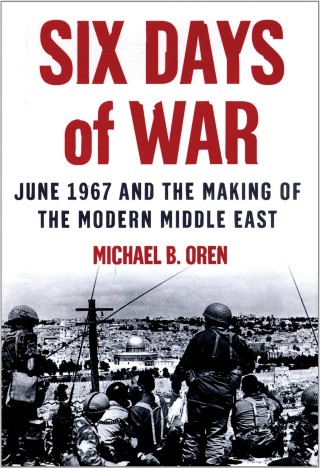
Six Days of War
کتاب های مرتبط
- اطلاعات
- نقد و بررسی
- دیدگاه کاربران
نقد و بررسی

Starred review from March 25, 2002
This is the most complete history to date of the Six Day War of 1967, in which Israel entered and began its occupation of the West Bank and Gaza Strip. While no account can be definitive until Arab archives open, Oren, a Princeton-trained senior fellow at Jerusalem's Shalem Center who has served as director of Israel's department of inter-religious affairs and as an adviser to Israel's U.N. delegation, utilizes newly available archival sources and a spectrum of interviews with participants, including many Arabs, to fill gaps and correct misconceptions.Further, Six Days of War
is an attack on "post-Zionism": the school of politics and history that casts Israel as the author of policies that intentionally promote the destuction of Palestine as a separate entity and of Palestinians as a people, not least through the occupation that began with the 1967 War. By contrast, Oren convincingly establishes in an often engrossing narrative the reactive, contingent nature of Israeli policy during both the crisis preceding the conflict and the war itself. As Prime Minister Levi Eshkol held the Israeli Defense Forces in check that May, Operation Dawn, an Egyptian plan for a preemptive strike against Israel, came within hours of implementation. It was canceled only because Egypt's President Gamal Abdel Nasser feared it had been compromised. Israel's decision to seek its own security in arms was finally triggered, Oren shows, by Jordan's late accession to the hostile coalition dominated by Egypt and Syria. Geographically, the West Bank, then under Jordanian rule and occupation, cut Israel nearly in half. The military risk to Israel was unacceptable, Oren makes clear, in the context of a U.S. enmeshed in Vietnam and a West unwilling to act even in support of the status quo. Far from being a product of strategic calculation, Oren further argues, occupation of the West Bank and the Gaza Strip was also contingent: the consequence of a victory so rapid and one-sided that even Israel's generals found it difficult to believe it was happening. Israel, having proved it could not be defeated militarily and now possessing something to trade, hoped for comprehensive peace negotiations in a rational-actor model. Oren notes that some initiatives for peace did in fact develop. He seems, however, trying to convince himself along with his readers. Oren puts what he sees as Israel's enduring weaknesses in relief: not arrogance, but self-doubt, self-analysis and self-criticism, all carried to near-suicidal degrees in 1967. Arab policy, by contrast, featured a confident commitment to erasing Israel from the map. The Six Day War shook that confidence, he finds, but did not alter the commitment. About the nature of Israeli policy since the war, the book says little, but finds that "for all its military conquests, Israel was still incapable of imposing the peace it craved." (June)Forecast:This book will be given major national review attention and a major push via public radio and other outlets. A planned East Coast author tour will hardly be necessary, as Oren's phone should be ringing off the hook for comments on the current Israel/Palestine conflict. Despite its highly detailed play-by-play, this book could very well hit the bestseller list as readers, drawn by the subtitle, try to educate themselves.

























دیدگاه کاربران